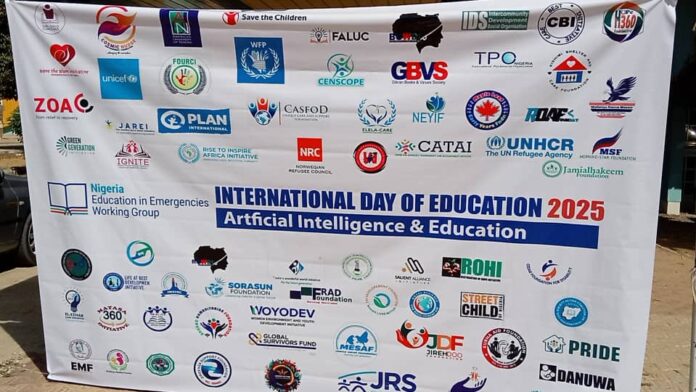In a groundbreaking address at the University of Maiduguri, Borno State, the UNICEF Chief of Field Office, Joseph Senesie, called upon critical stakeholders in the northeast to harness the power of artificial intelligence (AI) to combat the alarming rate of out-of-school children in the region.
During the commemoration of the 2025 International Day of Education, Senesie highlighted the pressing issue that more than half of the children displaced by conflict in North East Nigeria are currently out of school. This stark reality underscores the urgent need for innovative solutions to ensure that every child has access to quality education.
Senesie emphasized the theme of the 2025 International Day of Education, “Artificial Intelligence (AI) and Education – Preserving Human Agency in a World of Automation,” as a crucial opportunity to explore how technology can be leveraged to expand learning opportunities for children and youth in the region.
He shared the success story of the Nigeria Learning Passport (NLP), a digital learning platform supported by UNICEF in collaboration with the Borno State Government and funded by key partners. The NLP provides free access to localized education content, offering a wide range of teaching and learning materials aligned with the national curriculum.
With over 290,000 users across 18 states and more than 102 teachers and 38,657 learners actively engaged in Borno State alone, the NLP has proven to be a game-changer in enhancing digital literacy and pedagogical skills among educators and students.
Despite the progress made, Senesie acknowledged the persistent gaps in reaching the most disadvantaged children in rural communities with inclusive education. He urged the government and partners to allocate sufficient resources for digital learning, emphasizing the transformative impact of technology on increasing access to knowledge and skills acquisition.
As UNICEF continues to collaborate with the government, donors, and partners to provide safe and quality education for girls and boys affected by conflict in Nigeria, Senesie’s impassioned plea resonates globally, drawing international attention to the critical issue of out-of-school children and the imperative of leveraging AI to address this crisis.
In a final message to the children, Senesie emphasized their role as both learners and leaders, encouraging them to seize the opportunities that education offers and strive for a better future through knowledge and values acquisition.
The Borno State Commissioner of Education, Lawan Wakilbe, called on students to find opportunities in technology and embrace it in their day-to-day activities.
By Ahmed Liman Kingimi




